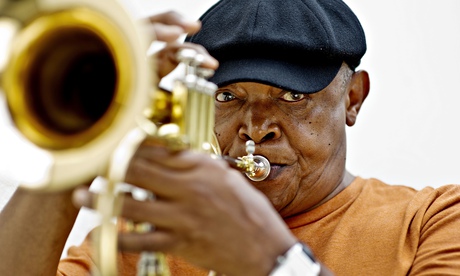
“If you know this song, then like me you are a very old person,” announced Hugh Masekela, as he launched into Grazing in the Grass, the easy-going, lilting instrumental that became a massive crossover hit in the US in 1968, a year after he had famously brought his South African jazz styles to the Monterey pop festival. He has always been an inventive, eclectic musician, famed in the jazz world for his flugelhorn work but equally celebrated for bringing African music to a global audience. This exuberant performance was a reminder that he is also an inspired entertainer, able to express his dismay at global politics while displaying a delightfully surreal sense of humour.
Masekela celebrated his 75th birthday this year, but he seemed more eager than ever to show off his energetic playing, singing and dance moves. Backed by a (mostly) South African band, with two percussionists, guitar, bass and keyboards, he reworked favourite songs from throughout his career, starting with Languta, a funky piece from the early 70s, which began with a driving horn solo, followed by a demonstration of his husky, powerful vocal work. He spent as much time singing as playing, turning Market Place into a furious duel, as his guitarist Cameron Ward echoed his increasingly rapid-fire scat vocals, but saving the finest vocal and horn work for a powerful treatment of Stimela, his poignant song about South Africa’s immigrant workers. Fela Kuti’s Lady was also revived, with the jazz-funk workout now dressed up with Masekela’s cheerfully inspired theatrics.
There were further echoes of Fela from American jazz singer Somi, who opened the show with an impressively varied set. Born to Ugandan and Rwandan parents, she mixed African influences, jazz-rock and delicate balladry, and her best songs were angry protest pieces inspired by her visits to Nigeria. An artist to watch.

